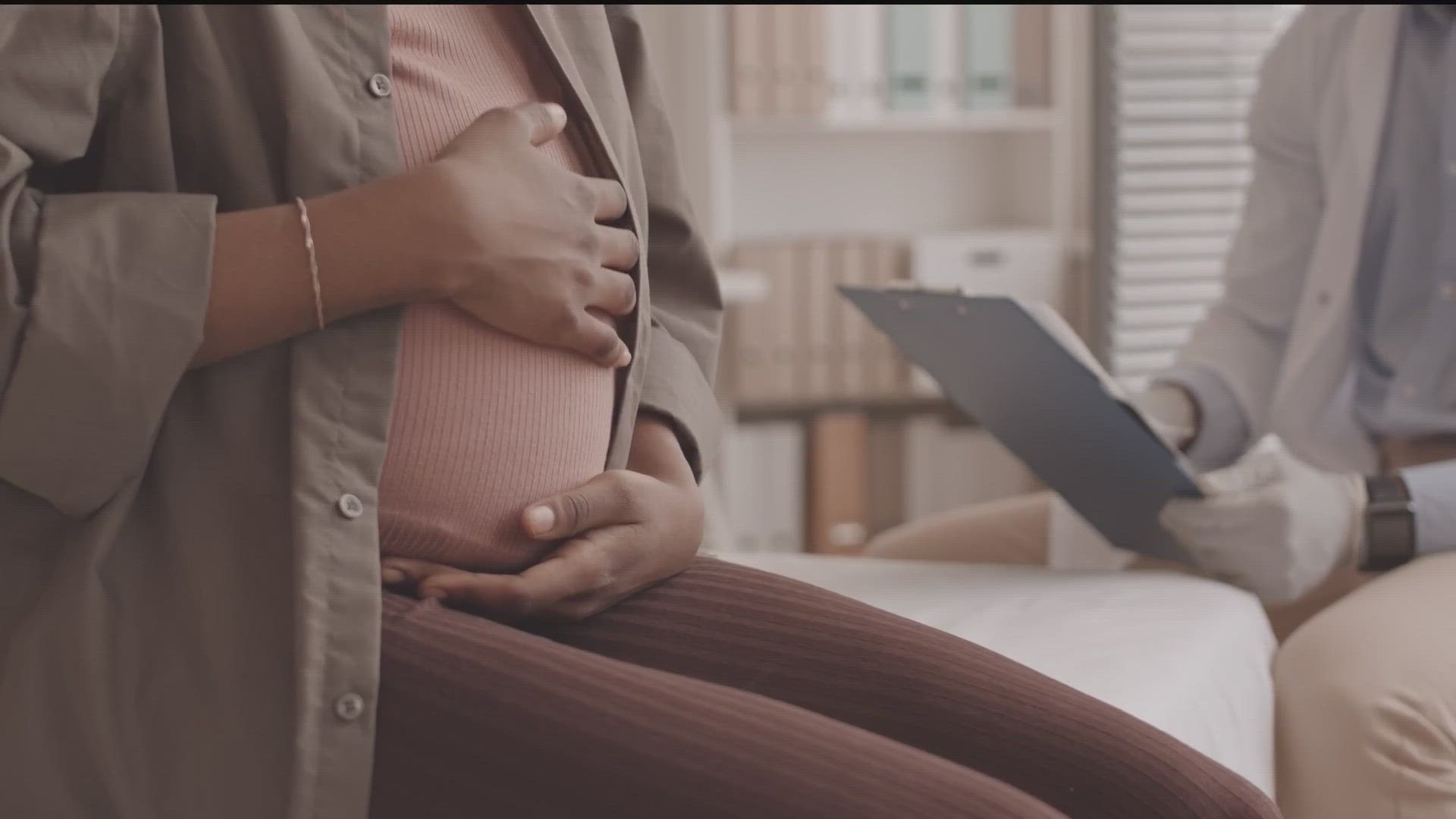The 'post Roe v. Wade space' | Doctor shares the state of maternal health care in Georgia
Having access and getting proper care can be a challenge for some moms. In a Q&A, 11Alive spoke with a doctor about the state of maternal health in Georgia.

Maternal health in Georgia has historically been an issue for mom and moms-to-be.
Black mothers are at the highest risk for pregnancy-related deaths in the state. And nationwide, Pew Research Data shows Black women in the U.S are about three times more likely to die during and after childbirth than white women.
Having access and getting proper care can be a challenge for some moms. Following the passage of Georgia’s "heartbeat bill," some women looking to terminate their pregnancies and even some healthcare providers still have questions about what services they can legally obtain and provide.
Those women looking forward to starting a family have questions about where they can go to get the best care -- and make sure their concerns are heard and not ignored.
11Alive spoke with Dr. Madeline Sutton, a board certified OB/GYN at Grady Hospital about the state of maternal health in Georgia.
Here's what she said during the Q&A.
Abortion restrictions 'They aren't even fully aware'
Question: What are you seeing in your practice right now after abortion restrictions passed in Georgia?
Sutton: "There are a range of things that we're seeing for many people. There are some women who come in, they might be a little bit past six weeks and they aren't even fully aware that this new law has gone into effect. And so then they are left trying to search and figure out what their next step is going to be if they choose not to continue the pregnancy."
"There are some who come in and they might be having, you know, something, a complication because they tried something from home because now more people are seeking things through the mail. So, if they come in and they have something that they have a question about or they aren't used to the amount of bleeding that they're having or the pain, then they also are being counseled," Sutton said.
"I think we're seeing more of them because more people are trying to do things at home while there's this uncertainty about what you can and can't have done -- or if you're going to be in legal trouble if you try to have certain things done."
"Certainly people are asking more questions. If they learn that they are newly pregnant, they have a lot more questions about what's going on. All of this is happening at the same time that we're talking more about maternal mortality in this country. More people are trying to make sure that they can access care that is acceptable to them and that they feel will allow them to be fully heard and understood so that they can be safe if they do choose to continue the pregnancy," Sutton said.
Providing care 'This post Roe v. Wade space'
Question: As a healthcare provider, is there any fear that you could get legal push back for performing a D&C or miscarriage care?
Sutton: "Well, not so far. It's a great question, though. I definitely have concerns about pushback happening in other states where I have colleagues. We have conversations all the time because we're all just trying to figure out what's OK and what's not OK in this post Roe v Wade space. Georgia so far, especially after the Biden administration signed the executive order that allows emergency care to happen in emergency settings across the country,
"I feel comfortable when women come in with miscarriages, whether it's a spontaneous miscarriage or whether it's an incomplete miscarriage that may have happened after taking a medical abortion pill," Sutton said.
"I feel very comfortable providing the care that they need to make sure they're healthy and safe."
"Ultimately, that's what we providers want to do. We want to make sure that women and other birthing people are able to be healthy and safe so that they can continue to live their lives however they choose," Sutton said.
Maternal deaths Provider bias and systemic racism
Question: What is missing in Georgia's health care system that could prevent maternal deaths?
Sutton: "As some of the recent data shows, many of these deaths are preventable. Some as much as 60 to 80%. I think one of the things that Georgia and Louisiana have in common -- and each year it varies -- sometimes Louisiana's on top, Sometimes we're on top [for the maternal mortality ranking]. But we're usually one in two in terms of high maternal mortality. I think what they have in common, you know, we're in the southern part of the country. Both are states that did not have Medicaid expansion. That's one of the things that a lot of studies show that women have in common in terms of challenges to access or late diagnoses."
"Certainly there's provider bias, but there's also some other systemic racism factors that are impacting it. So, whether you're talking about disproportionate access to educational opportunities, employment opportunities, things that could allow someone to more easily access appropriate types of health insurance coverage -- and that includes Medicaid -- those things disproportionately negatively affect Black and brown women and other birthing people. That's certainly contributing to what we see in Georgia and Louisiana," Sutton said.
"Some of the things that we can do to resolve that -- certainly Medicaid expansion in the states where they haven't done it yet would allow more women to be able to access care earlier if they choose to," Sutton said.
"One of the things that we're having success with is more extended postpartum coverage."
"So traditionally, postpartum care had been defined as up to six weeks. As we know, maternal mortality can include deaths that happen up to a year after being pregnant. So, efforts that are successful to expand that postpartum coverage to up to a full year will also, I think, have a huge positive impact on women's access," Sutton said.
The resources Understanding what's available
Question: What resources do women have to get their questions answered?
Sutton: "Oh, great question. So, you know, I have some friends and patients too, that Google is their favorite friend. So definitely Google. But one of the things, especially here at Morehouse [School of Medicine], there's a resource, a maternal Center for Maternal Health Equity. If someone were to go to that page on the Morehouse website, they would get a host of local resources. They would also receive information about different research studies that are going on. Dr. Hernandez does a great job as Executive Director of that, trying to make sure that not only is Georgia getting better understanding in terms of what's going on and getting helpful resources, but how can Georgia work with other states in the country to try to uplift as many people as possible who are affected by this."
'A river of blood:' A mom describes her near-death experience in the delivery room
"The Georgia Department of Health has a great website where they kind of summarize what's going on in Georgia and give women information. Another thing that's important to know, because this affects the maternal mortality as well as what's going on in terms of the more rural areas of the state and trying to make sure that people are aware of the hospital closures. What's the closest one to you," Sutton mentioned.
"If there's a midwife in your area, who's certified and if you want like a home birth, what are some of the things to consider and the questions to ask if if that's the route you choose to go and if you are choosing to not continue the pregnancy, what are the resources that you have available to you as well? You know, making sure that if you do get a prescription that you go to a pharmacy that's friendly, that will not block your access to that medication," Sutton added.
11Alive has extensively covered maternal mortality rates in its series Mothers Matter. Read and watch all of the episodes here.


